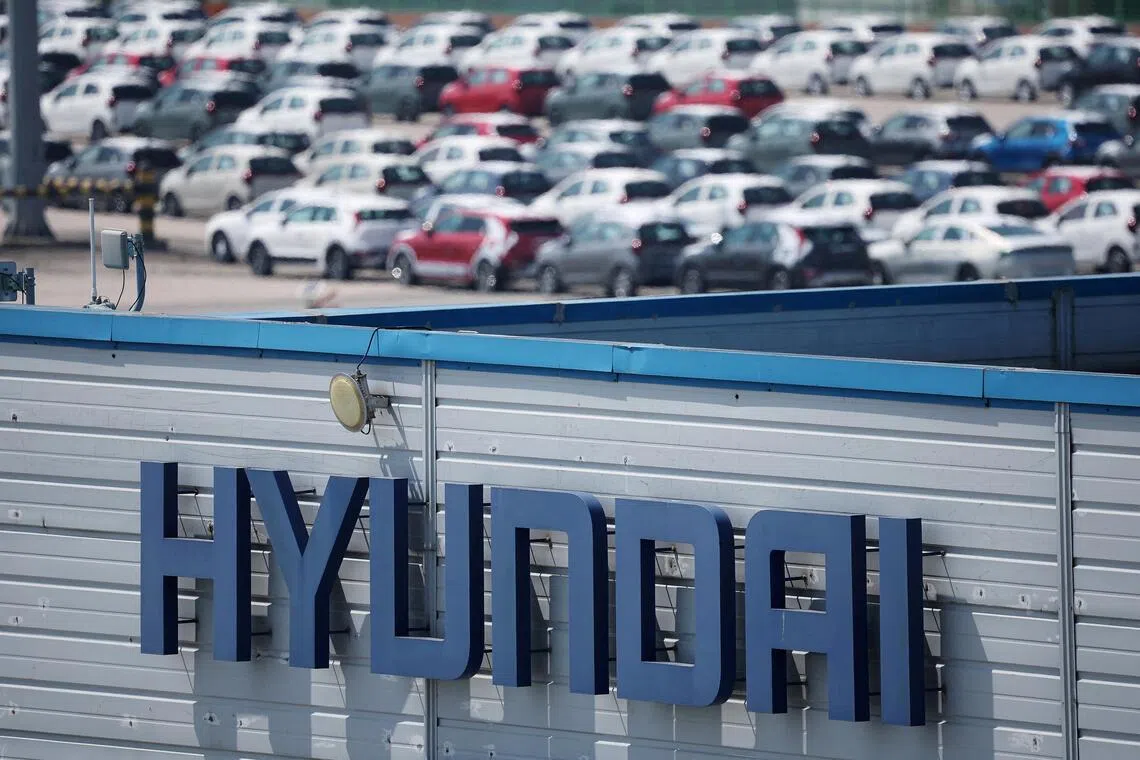South Korea says US projects will remain in limbo until visa issue is fixed
Sign up now: Get insights on Asia's fast-moving developments

The two countries are working to revise the visa system after hundreds of South Koreans were taken into custody in a raid on a Hyundai Motor Co and LG Energy Solution battery plant.
PHOTO: REUTERS
SEOUL - South Korea’s investment projects in the US will remain in limbo until visa issues are resolved, said the nation’s Prime Minister, urging Washington to act quickly to reassure South Koreans concerned about getting detained while working there.
“Without resolving the visa issue, meaningful progress remains virtually impossible,” Prime Minister Kim Min-seok told Bloomberg News in Seoul on Sept 24 in an exclusive interview that also touched on defence spending and North Korea.
“Although the projects have not been entirely halted or formally placed on hold, it will be very difficult for a large number of workers to enter or re-enter the US until this problem is resolved,” Mr Kim said, referring to the visa issue, which has also cast a cloud over an additional US$350 billion (S$451 billion) investment fund agreed upon in a July trade deal.
The two countries are working to revise the visa system after hundreds of South Koreans were taken into custody in a raid
The detainees were released and returned home about a week after the raid but the incident has rattled South Korea, where images of shackled workers have circulated widely and fuelled public anger, casting a cloud over hefty investment plans by Korean conglomerates.
“In the absence of firm assurances regarding their safety, both they and their families are understandably reluctant to enter the US again while this matter remains unresolved,” Mr Kim said.
The visa issue hit the allies just as South Korea and the US are engaged in intense negotiations to finalise a trade deal that sets a 15 per cent tariff on South Korean goods including automobiles. Finalising the agreement has proven difficult as the two sides remain divided over how to structure and execute the US$350 billion investment package, a central pillar of the agreement.
The investment pledge with Washington amounts to more than 70 per cent of South Korea’s foreign reserves, and the shock to the Korean economy would be severe without a currency swap agreement with the US, Mr Kim said.
President Lee Jae Myung recently said in a Reuters interview that a swap agreement is needed to avoid an economic crisis similar to what South Korea experienced in 1997 during the Asian financial crisis, if the nation tries to meet all the US demands.
Mr Kim declined to go into details of the ongoing negotiations but said a deal that puts a significant fiscal burden on South Korea may require parliamentary approval. He said he hoped talks over the deal would not extend into 2026.
“There’s the feeling that it’s difficult for us to accept that, not just the negotiating team, but also among the public,” Mr Kim said, referring to US demands similar to those set out in Japan’s US$550 billion investment pledge.
The Japanese deal gives US President Donald Trump the option to raise tariffs on Tokyo if it chooses not to fund projects he puts forward, or does not provide funding within 45 days.
On security, South Korea is looking to raise its defence spending to 3.5 per cent of its gross domestic product (GDP) over the next 10 years as part of a broader push to strengthen its independent national defence, Mr Kim said.
“Recently, we mentioned 3.5 per cent, and we did so because we judged that this is a level we are capable of sustaining,” he said. South Korea plans to spend 2.32 per cent of its GDP on defence in 2025.
Mr Kim’s office later said that raising the country’s defence budget is still under discussion and that a decision has not been made.
A failure to reach an early deal may inject awkwardness into another expected meeting between Mr Lee and Mr Trump in October when the US leader visits South Korea to join a gathering of Asia-Pacific Economic Cooperation leaders in Gyeongju.
As South Korea prepares to host the regional event, North Korean leader Kim Jong Un has floated a potential meeting with Mr Trump, saying he has “good memories” of the US leader and could talk with him again if Washington drops its denuclearisation demands.
“We are not aware of any concrete dialogue taking place between the US and North Korea,” the Prime Minister said. Asked about a potential meeting between Mr Trump and North Korea’s Mr Kim, the premier said: “Since unexpected events can always occur, I believe we can leave open the possibility.” BLOOMBERG


